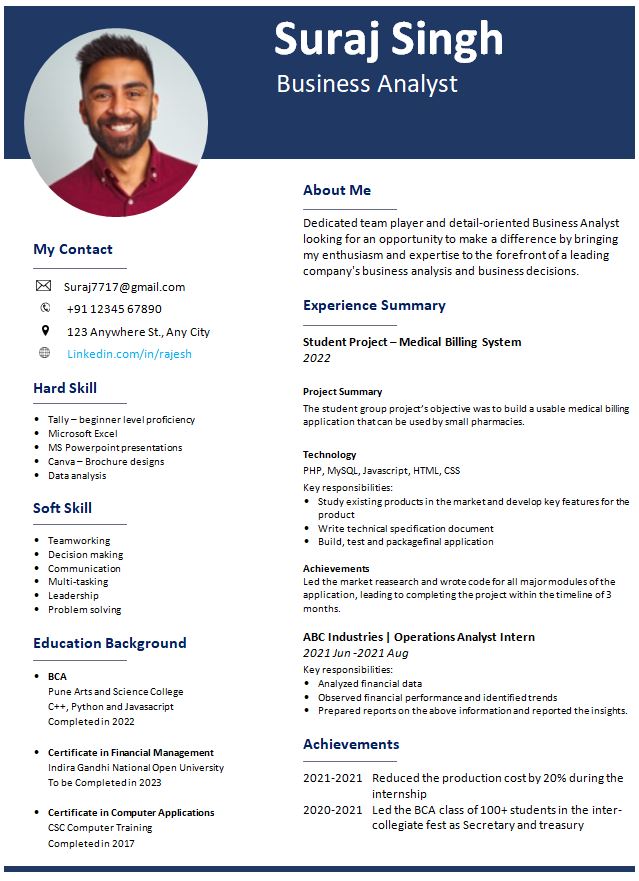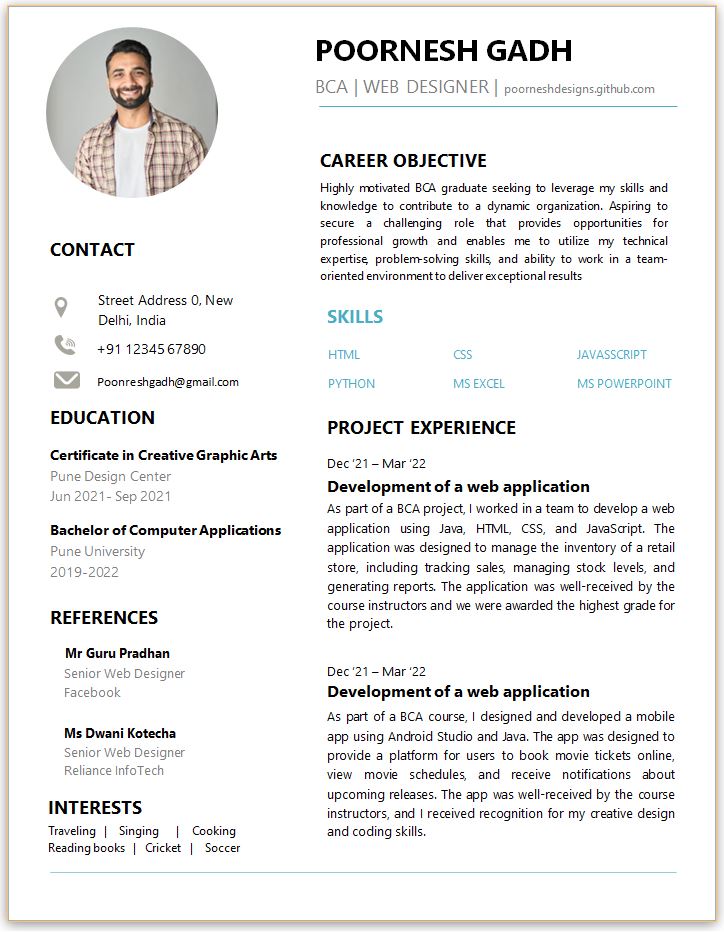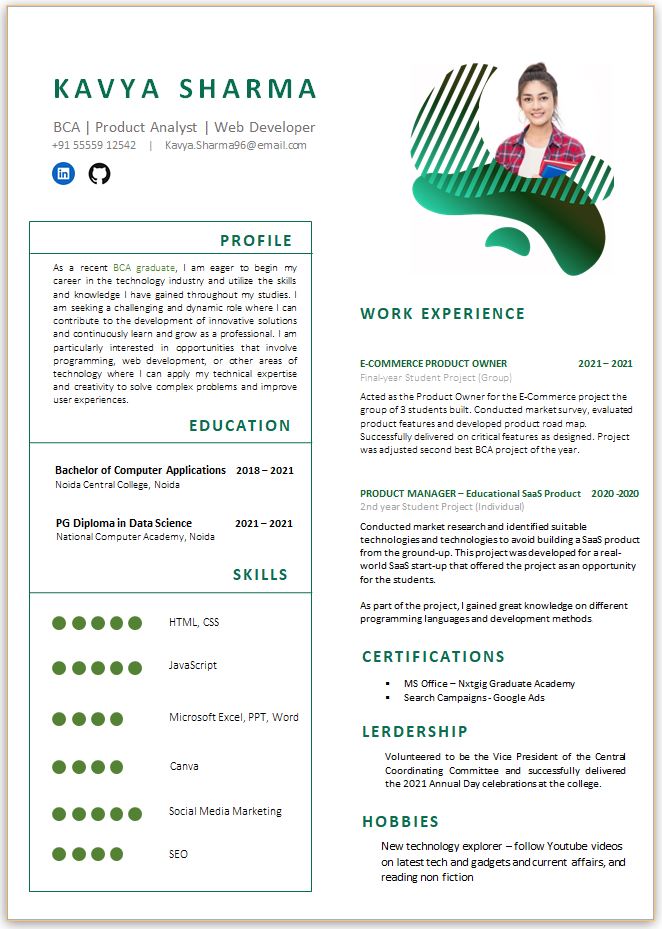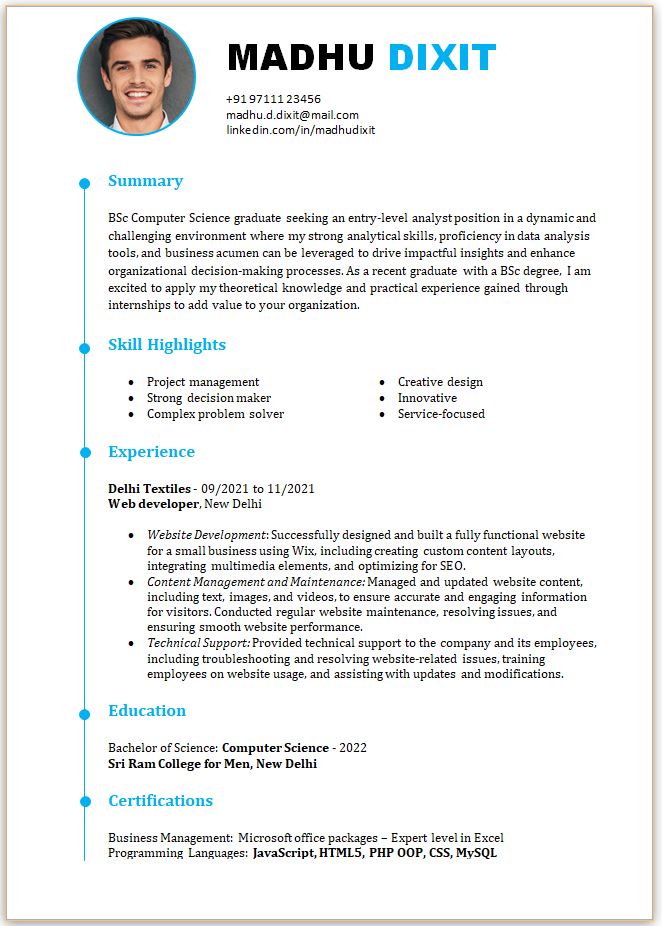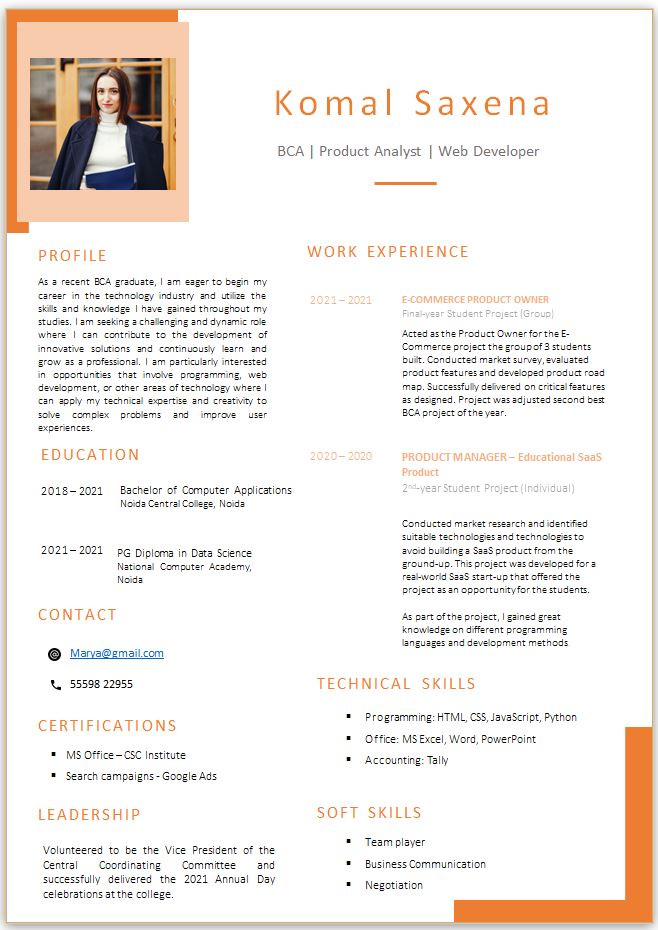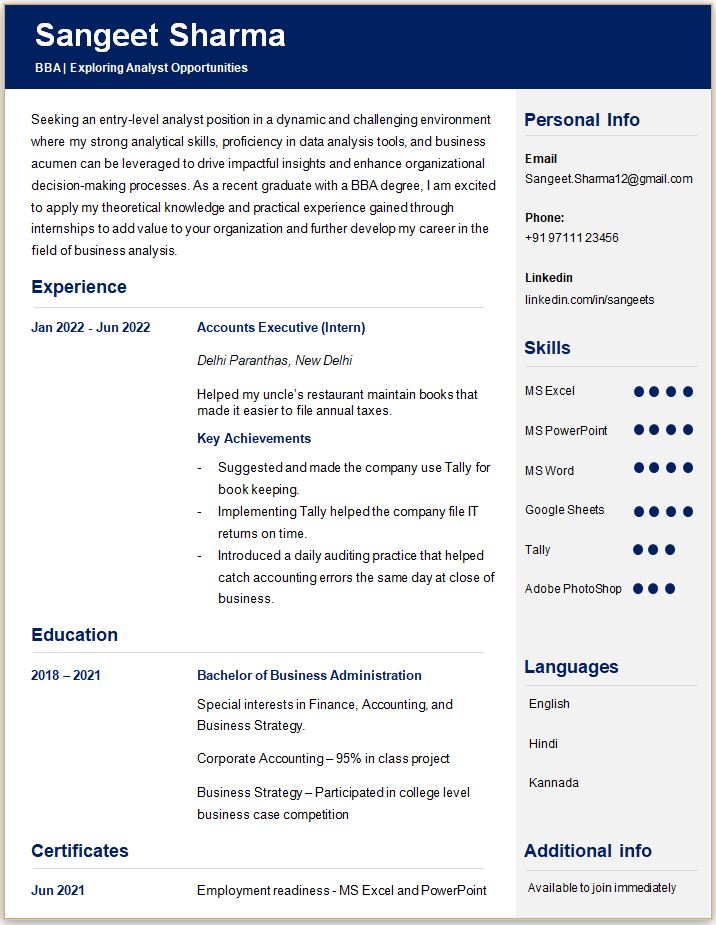How to create resume for freshers
+ free examples

14 Jun 2023

What is a fresher resume?
What people generally call a fresher resume is a resume of a job seeker who hasn't had a formal employment yet. Basically, someone who most probably graduated from college recently and is looking out for their first formal employment. So, if you are someone who recently graduated, your resume could be called a fresher resume.
Before we get cracking with vital information on how to go about constructing your resume, we will take a look at some of the challenges in creating a fresher resume. Of all the challenges the fresh graduate faces in constructing her first resume, there is one question that stands out because of how confusing and make the whole experience of creating a resume a daunting experience - do you need CV or a Resume?
Do you need a CV or a Resume or a Bio Data
It is common that all these three are used interchangeably often and that is part of the problem. Our staff Piraimathi Murugavel has written an excellent, to-the-point article on these differences. You can read it here, but I will summarize it quickly here so we can cover the other aspects.
While Resume, CV and Bio Data all cover essentially the same information, they do vary in the importance given to specific sections on them. Let's take a look at them.
If you are looking for a job in a professional setting, like in companies, you need a Resume. Period. A resume is usually a one page document (professionals working for several years for different companies might go up to two pages) that crisply highlights work experiences, skills and specific achievements. It is quick to the point and a great marketing tool in your career arsenal. It can include your picture, but it need not. It can be colorful or plain in black and white. They all work. Creating a resume is the subject of this article so hang on.
CV stands for Curriculum Vitae and it is required for all academic positions such as lecturers, professors, researchers, research assistants, lab assistants, Principals, application to PhD positions etc. You get the point. So, if you are applying to academic positions in universities, colleges, think tanks or professional research organizations you will need to prepare a CV.
While the Resume is like a fast food version of your achievements in the form of a document, a CV is a proper 3-course meal. It is exhaustive and goes beyond highlighting achievements. For example, if you are referring to a project on your CV, you will not just stop with what you achieved working on that project. You will go on to include some background to the project, who your supervisor was, what grants you had for that project and if that project resulted in any academic publications and proceedings. So, in summary, if you are applying to academic positions, you will be exhaustive in your coverage of your achievements, mostly your academic and research accomplishments and credentials. That's a CV.
Bio-Data is the most brief of all 3. It is a one page document that just has very basic but essential information about you, such as name, address, and qualifications. Bio data still lives in certain environments but most professional organizations have moved on rom the era of Bio Data. Resume is the standard document you will be expected to apply with for positions.
To conclude, if you are going to apply to companies for positions, you will prepare a resume and not a CV or a bio Data.
Sections to include on a fresher fresume
While the fresher resume is not very different from an experienced resume, there are some subtle differences that needs to be paid special attention to on the fresher resume. We will list all necessary sections that are ideal to include on a fresher resume.
I want to highlight something at the outset. As a fresh graduate, employers understand that you may have limited professional experience. Focus on highlighting your education, skills, projects, and any relevant internships or part-time jobs. Tailor your resume to each specific job application by emphasizing the skills and experiences that align with the job requirements.
1. Contact Information
Start with your full name, followed by your phone number, email address, and optionally, your LinkedIn profile or personal website (if applicable). This section helps employers easily reach out to you.
If you go by a shorter name, it is okay to use that shorter name withing brackets after your first name. The phone number and email address are very important. If you have more than one phone number, include the phone number that you have with you all the time and have a higher chance of picking up. When you have started applying for jobs, be cautious about picking up calls from unknown numbers. Be conscious of your surroundings, noise levels, ambiance etc. so you can be courteous when taking the call.
A word of advice on the email – while it is not fair to be judgmental, you want to avoid every opportunity to be judged by how your email sounds. It is normal that one has multiple email addresses – one for gaming, one for OTT platform subscriptions and one for personal use. Whatever the case may be with you, use the email address that is your firstname.lastname@somemail.com. Do not use emails that sound unusual; example poorly chosen email addresses for resumes are crazyhunk@somemail.com or roxie4you@somemail.com. You get the point.
2. Objective statement
You can call this statement career statement, profile, objective, career objective etc., but they all will mean the same thing. Basically, this is the top most section on your resume that quickly describes why you are applying to this position.
The career objective statement elegantly summarizes who you are as a person and why you are applying to the job.
We have written an article that has several simple career objective statements. You can consider using one from that set of generic career objective statements.
If you choose to write your own objective statement, make sure to have no spelling or grammatical mistakes because the objective statement section is the first section the recruiter or hiring manager will see. You don’t want to have a bad first impression. Mistakes are normal, but by proof-reading your resume several times you can avoid it. You can also use the word’s spell checker to be sure that your resume does not have any spelling mistakes. Place special emphasis on subject-verb disagreements and tenses as you write your objective statement.
Ready to use Fresher Resumes
If you are a fresh graduate, we have a great range of free resumes you can download and use for free. Choose the resume that works best for you, download, change essential information such as your name, contact info, college, graduation year etc., and use.3. Education
Since the employers will know immediately that you do not have work experience yet, your best bet to catch their attention is to highlight your education first. If you have a great college project that directly or closely aligns with the position you are applying to, then it will make sense to start with the project first and then show the education. So, it is important that you tweak your resume to every job you are applying to. For some applications, you can keep the education as the first section and for the ones where your project closely aligns with the position on offer, move up the projects section.
If you are going to keep a standard resume to forward to your references, then we would suggest that you keep education as the first section, followed by your college project.
While including education, include the degree name clearly along with the specialization. It might make sense to indicate your CGPA or the class or distinctions you achieved below your degree. If it is not stellar, we suggest you do not include it unless the employer has asked you to include your CGPA in your resume.
Include the years you studied; just the years will do. Below the years of study, mention the college or university name. If your college is affiliated to a university, just the college name will suffice unless you strongly feel adding the name of the university adds value in form of the pedigree, noteworthiness etc. Optionally, you can include the name of the place where the college is located.
Repeat this process for all your post-secondary school qualifications including Diplomas. There is no need to include your 10th standard or Higher Secondary School level information on your resume, unless the employer has specifically asked for it.
4. Skills
Including skills in your resume as a fresh graduate is an excellent way to showcase your qualifications and demonstrate your suitability for the job. Here's how you can effectively include skills on your resume:
Identify Relevant Skills:Start by identifying the skills that are most relevant to the job you're applying for. Review the job description and make a list of the skills mentioned or implied. These can be technical skills specific to your field of study or transferable skills that are applicable across various industries.
Categorize Skills:Categorize your skills to make them easier to read and understand. You can have separate sections for technical skills, such as programming languages or laboratory techniques, and transferable skills, such as communication, problem-solving, or teamwork.
Be Specific:For each skill, be specific and provide details to give employers a clear understanding of your proficiency. Avoid generic statements like "good communication skills" and instead provide concrete examples or achievements that demonstrate your abilities. For instance, instead of saying "excellent communication skills," you could mention "strong written and verbal communication skills demonstrated through delivering presentations to a large audience during university projects."
Highlight Relevant Coursework or Projects:If you have completed coursework or projects that are directly related to the skills required for the job, mention them. For example, if you're applying for a software development position, you could list relevant programming languages you learned or specific projects you completed during your studies.
Prioritize Skills:Place the most relevant and in-demand skills at the top of each section. Tailor the order of skills based on the job requirements. This way, employers can quickly spot the skills they are looking for, even with a brief scan of your resume.
Provide Evidence:Whenever possible, provide evidence or tangible results to support your skills. For example, if you mention problem-solving skills, you could state how you successfully resolved a complex issue during a project or internship. This adds credibility and gives employers a better understanding of your capabilities.
Use Keywords:Incorporate relevant keywords from the job description in your skills section. Many employers use applicant tracking systems (ATS) to scan resumes for specific keywords. Including relevant keywords increases the chances of your resume getting noticed by both ATS and hiring managers.
Remember to be honest and accurate about your skills. Don't include skills you don't possess or exaggerate your proficiency. Employers appreciate honesty, and it's better to focus on showcasing your genuine abilities and eagerness to learn and grow in the role.
How to include skills on your resume?
You can create a small section made of text boxes or a table and list all your skills. You can group similar skills together; for example – Technical skills and Soft Skills. Under technical skills, you can mention all your tangible, technical skills such as programming, MS Office, design skills, and anything that you acquired through training and practice. Under soft skills, you can include generic traits that you are confident of. Examples of soft skills include verbal and written communication, teamwork and leadership, negotiation, etc.
There is a trend these days where candidates show on a scale of 1 – 5 or something similar how strong their skills are for each of the skills they list. We would not recommend that for fresh college graduate resumes because it confuses the employers more than it can help. For example, if you are listing 5 skills, and you have PHP as one of your skills on top, you will be forcing yourself to rank that skill quite high. It is unfair to expect that you will be able to defend your PHP skills during an interview with a very seasoned industry veteran. But, there are exceptions. If you are really confident that your PHP and blockchain (for example) skills are far too superior to industry average, then by all means go ahead and rate yourself very high or 5 stars.
5. Projects or internships
Highlight any significant projects or internships you completed during your studies. Describe the projects briefly, mention your role, and highlight the skills or achievements gained. Focus on how your experiences are relevant to the job you're applying for.
Simply put, your internships and projects are your work experiences, so don’t take them lightly. Treat them as such. By taking them seriously, you will focus on achievements in your projects and internships rather than focusing on merely listing your roles and responsibilities in your projects and internships.
Some examples are below. You can clearly see how well structured and impactful the good example is.
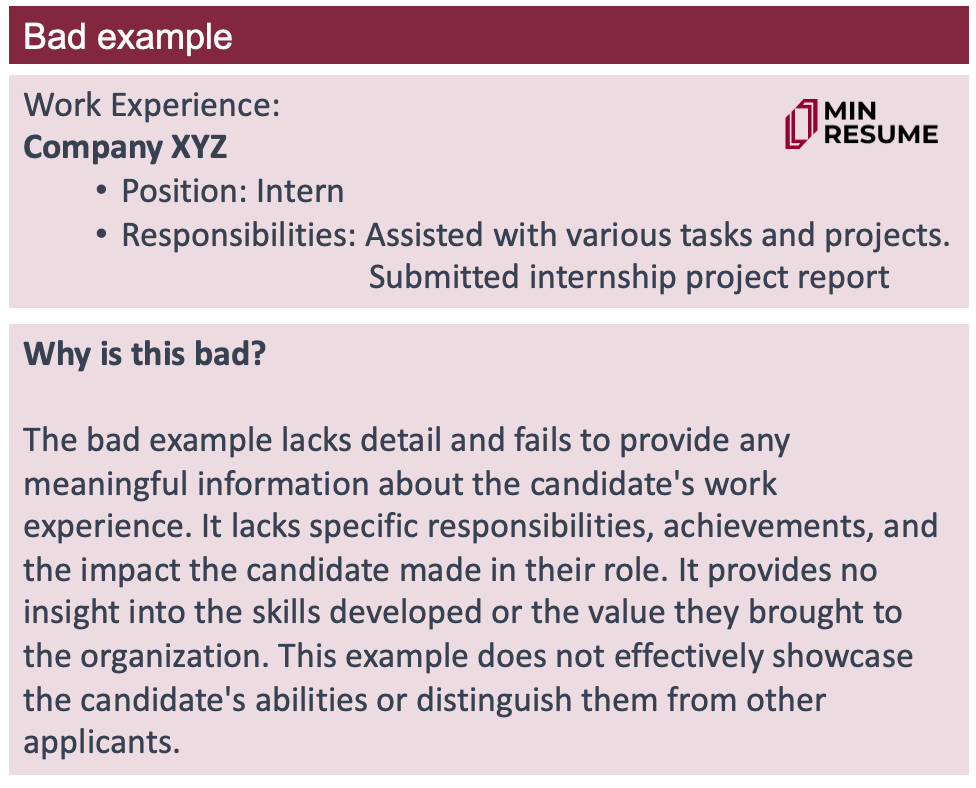
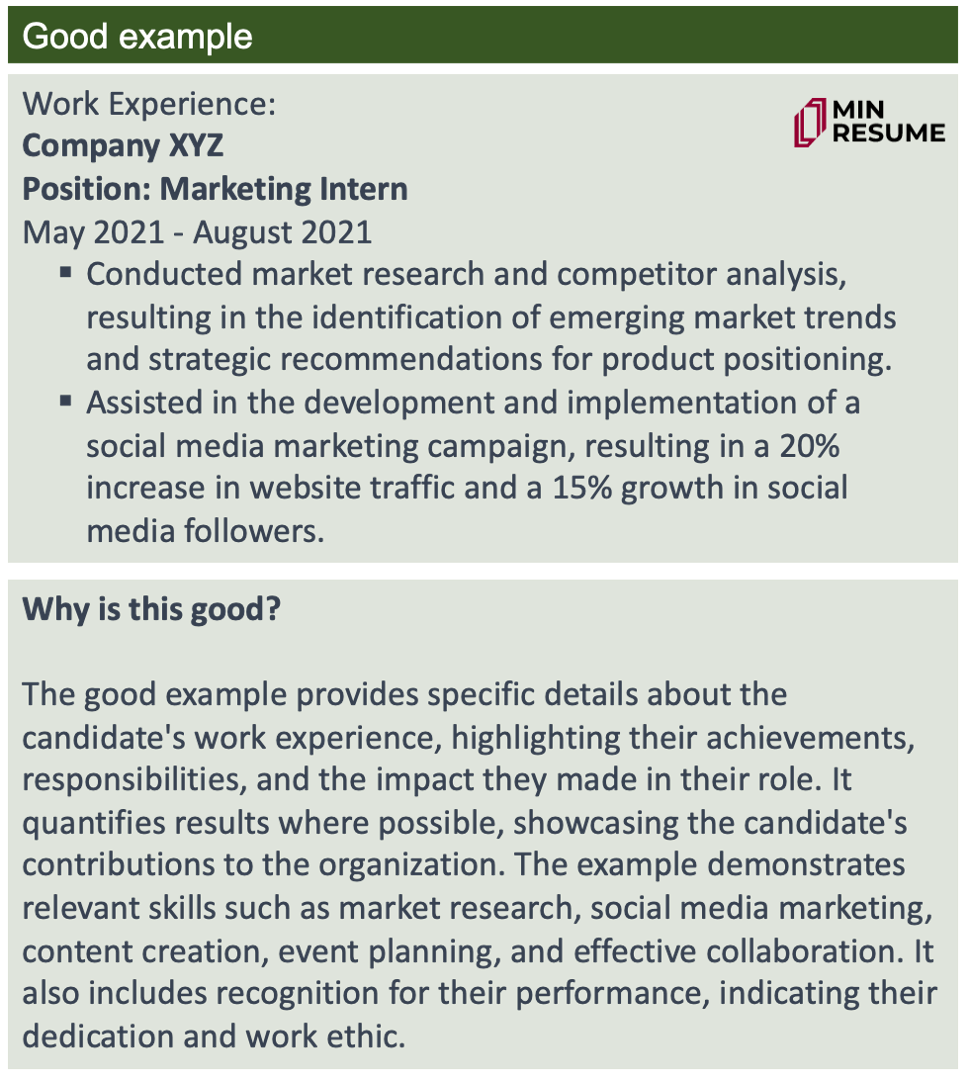
The projects do not need to be limited to the ones you worked on as part of meeting your degree requirements. The projects can be freelance or independent projects as well. This is where including links to your public repositories like github and github pages, etc. will be a great help. If you are including public repositories, make sure to maintain your repositories before sharing your resumes widely. Properly attributing your work where necessary and including Readme and including proper documentation for your work on Github are some examples of how you can be diligent about your public repositories.
6. Work experience
If you have any relevant work experience, list it here. Even part time work experiences that lasted only a few months and the ones that did not pay you anything at all count. What matters is you worked somewhere and you developed some skills. Include the company name, location, your job title, and dates of employment. Describe your responsibilities and achievements using action verbs and emphasize skills developed in the role.
By highlighting the skills, you developed during your work, you will immediately come across as someone who is very focused on learning and development and someone who can be easily trained. There is nothing more attractive on your resume than coming across as someone who is driven and easily trainable.
7. Leadership and Extracurricular Activities
Mention any leadership positions or involvement in clubs, organizations, or volunteer work. Highlight teamwork, communication, and organizational skills gained from these experiences.
Colleges conduct a variety of events throughout the academic year for college students to participate and actively contribute to the success of the event. If you are still in college, you would want to consider playing some role in these events – it need not be anything big. It can be even a volunteer position, which you can include in your resume under leadership and extra-curricular activities.
If you have participated or led any events outside your educational environment, those can be included as well under the leadership and extra-curricular activities section.
Here are some examples of leadership and extracurricular activities that you can include on your resume as a student, showcasing your involvement outside the educational environment:
Student Organization Leadership:Mention any leadership roles held in student organizations, clubs, or societies. For example, you can highlight your position as President, Vice President, Treasurer, or Event Coordinator of a club related to your field of interest.
Community Service and Volunteering:Include any volunteer work or community service activities you have participated in. This can involve organizing or participating in fundraisers, charity events, environmental clean-ups, tutoring programs, or mentoring initiatives.
Sports and Athletics:Highlight your participation in sports teams or athletic activities. Mention any team captaincy, organizing tournaments, or achievements in individual or team sports.
Event Planning and Coordination:If you have been involved in planning and organizing events, whether within your educational institution or outside, mention your role and responsibilities. This can include coordinating conferences, workshops, cultural events, or fundraising activities.
Student Government:If you have been a part of the student government or student council, include your position and the initiatives you were involved in. Highlight any responsibilities related to representing student interests, organizing campus events, or facilitating communication between students and faculty.
Let us take a look at an example: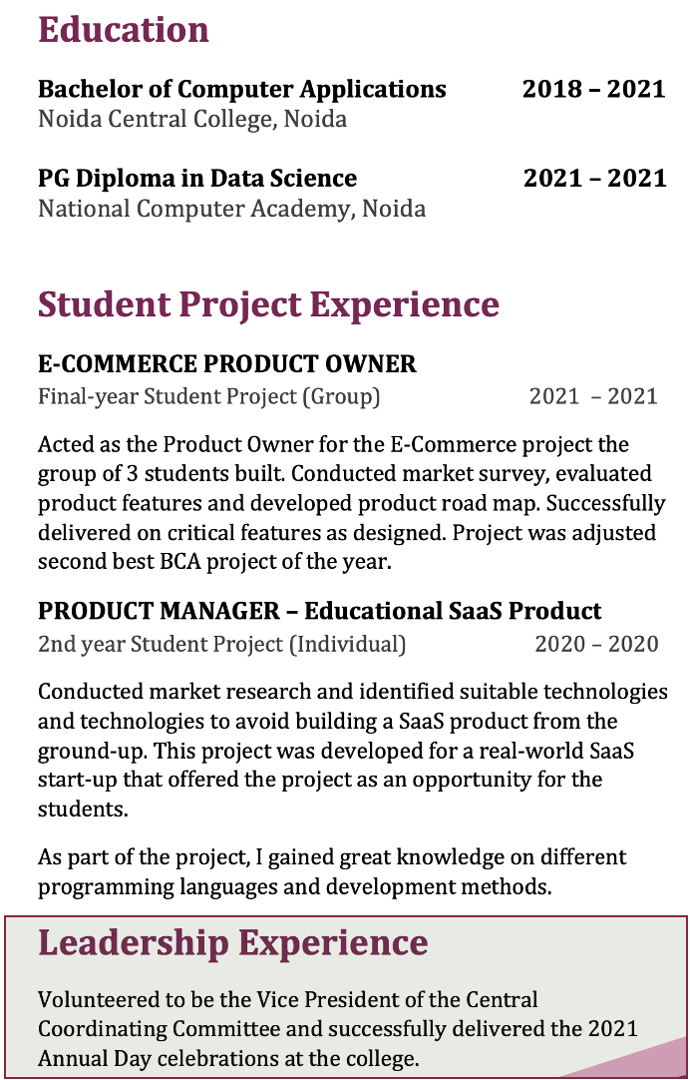
You can see that this candidate clearly calls out her contribution to the Annual Day event. It might look like a trivial inclusion, but you will get rewarded for considering this engagement a leadership trait when a recruiter reviews the resume.
Entrepreneurship and Startups:If you have been involved in entrepreneurial activities or startup initiatives, mention them. This can include participating in startup competitions, launching your own small business or social enterprise, or serving in a leadership role within a startup team.
Arts and Creative Endeavors:If you have participated in artistic or creative activities, such as music, theater, dance, writing, or visual arts, mention your involvement. Highlight any performances, exhibitions, or leadership roles within artistic groups or organizations.
Professional Association Membership:If you are a member of any professional associations or societies relevant to your field of study, include that information. This demonstrates your commitment to professional development and staying connected to industry trends.
Remember to provide as bullet points specific details about your roles, responsibilities, and achievements within these activities. Focus on transferable skills such as leadership, teamwork, communication, problem-solving, and organization. Also remember to quantify your accomplishments whenever possible and emphasize any significant impact or outcomes resulting from your involvement.
Including these leadership and extracurricular activities on your resume shows your ability to balance academics with other commitments and highlights your well-roundedness and initiative outside the classroom.
8. Certifications and Training
If you have obtained any certifications or completed relevant training courses, include them in this section. Specify the certification name, the issuing organization, and the date earned.
Given there are ample opportunities to pursue certifications outside of college, you should definitely consider taking relevant certifications and including them in your resume under Certifications and Training section.
Including certifications and trainings in your resume is a great way to show to your potential employer that you are driven, motivated, career-focused and took interest in developing your skillsets beyond what the college curriculum had to offer to improve your career prospects.
Here are some resources for you to consider:- MIT Edx offers a variety of courses for free from Humanities to Engineering.
- Code Academy is a great source for learning to code.
- Coursera offers a variety of courses, and some free.
- Harvard University Online offers anything from arts and science to AI
- Kadenze offers courses geared toward art, music, and creative technology.
- Khan Academy offers a large array of free courses.
- Skillshare is great for courses in UI/UX and Photography.
- Udemy offers a massibe list of courses across skillsets.
9. References
It's common to omit the references section from the resume. Instead, state that references are available upon request. Be prepared with a separate document containing the names, contact information, and professional relationship of your references.
Unless your employer explicitly asks you to include references on your resume, it is best to omit references. If you want, you can just mention “References available upon request” at the bottom of your resume.
10. Formatting tips
My tips on formatting are quite simple. Less is more. Simpler the better. Do not go for extravagant fonts that aren’t usually used in resumes. Stick to standard formats. The main reason I discourage candidates from using fancy fonts is because you never know how the recruiter and hiring managers might consider your flair for fancy fonts. If you end up sending your resume in word format, as some recruiters sometimes might want you to, then if the recruiter does not have the fonts installed on her computer, your fonts will look very different to how you set them originally. Fonts changing when opening is the number one cause for formatting collapse. So, be safe and use standard fonts. I wrote an article on formatting tips. You might want to give it a quick read.
- Use a clean and easy-to-read font.
- Keep the resume well-organized with clear headings and bullet points.
- Use concise and action-oriented language.
- Proofread carefully for grammar and spelling errors.
11. Hobbies and Interests
Including hobbies and interests in your resume as a fresh college graduate can help showcase your personality, interests, and well-roundedness beyond your academic achievements. However, it's important to be selective and strategic about which hobbies and interests you choose to include. Focus on activities that demonstrate transferable skills or qualities that are relevant to the job you're applying for. For example, if you're applying for a role that requires teamwork, you can mention team sports or group activities that highlight your ability to collaborate effectively. Additionally, consider hobbies or interests that align with the company culture or industry, as this can indicate your passion and dedication in related areas.
When including hobbies and interests on your resume, provide brief but descriptive details to give employers a glimpse into your involvement and what you've gained from these activities. Instead of simply listing hobbies, mention specific achievements, roles, or responsibilities within those hobbies or interests. For example, if you enjoy photography, you can mention that you have honed your skills by participating in local photography competitions or by volunteering as a photographer for events. This highlights your commitment, creativity, attention to detail, and ability to work independently. However, be mindful of the space on your resume and prioritize other sections that hold more weight, such as education, skills, and relevant work experience.
I wrote exhaustively on how to go about including hobbies in your resume in a separate article. You might want to give it a quick read, but I can tell you that it is completely okay to leave out the hobbies and interests section from your resume if you are not too keen on hobbies and interests. But, if you genuinely have a hobby and if you think that hobby has interesting parallels to the position you are applying to (for example, if you are an avid guitarist, that might mean that you are detail-oriented and patient), definitely consider including your hobby on the resume.
By thoughtfully selecting and presenting your hobbies and interests, you can provide employers with additional insights into your personality, skills, and dedication. This can help create a more well-rounded impression and demonstrate your potential as a candidate beyond your academic qualifications.
You can do it
There are thousands of jobs that hiring managers and recruiters across companies that span the entire spectrum of the size of the companies trying to fill every single day. There are more jobs than there are qualified candidates. If you are frustrated about not finding a job, don't be. Just add one technical skill that your dream job needs and do cold calling. You will be amazed at how quickly you can find your first job.
Now that you've read it
If you have found this article useful for you, you can spread some love and share the link to this article with your friends who may be struggling to prepare their first resumes.
We wish you the best of luck with your career!
